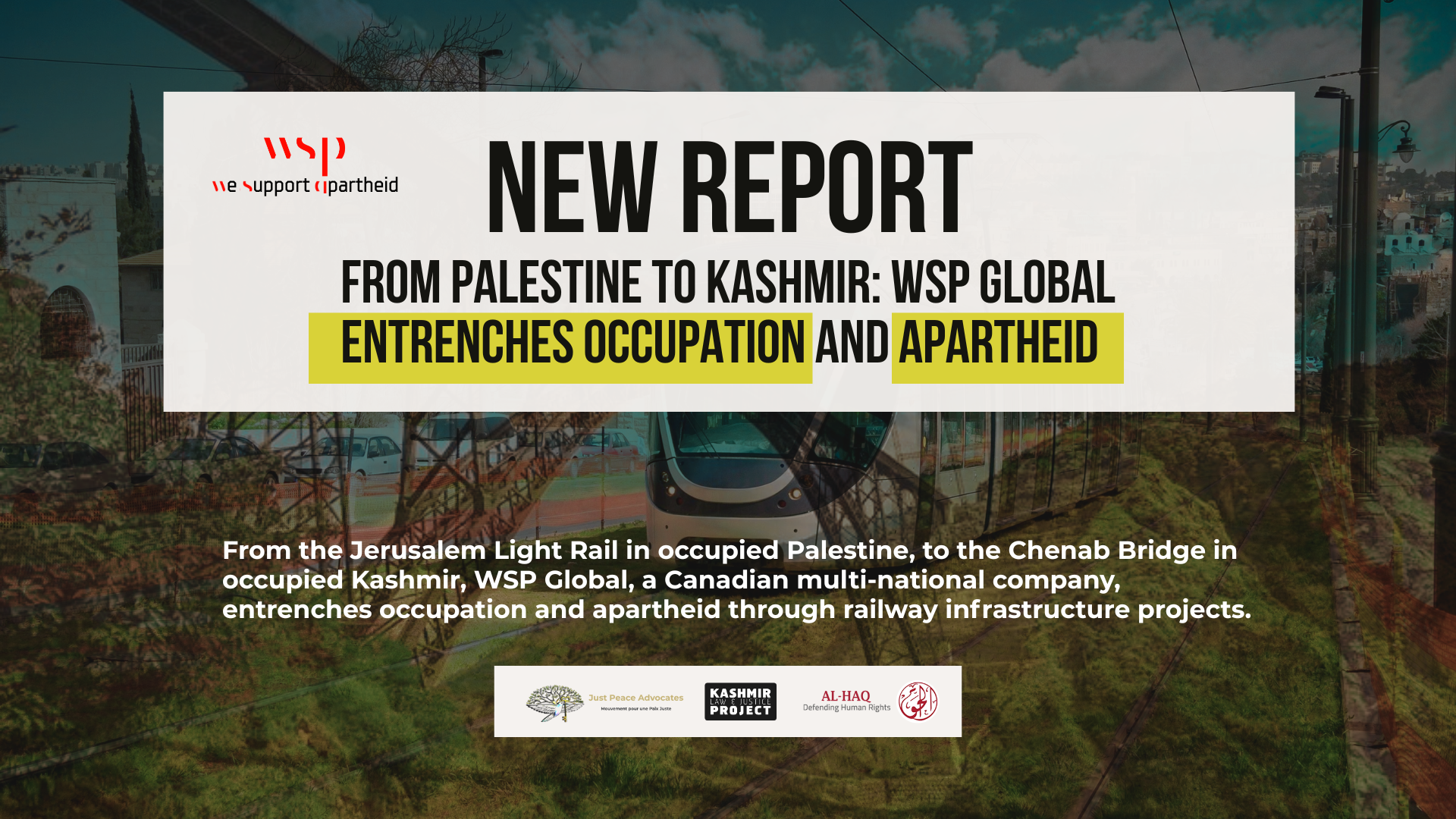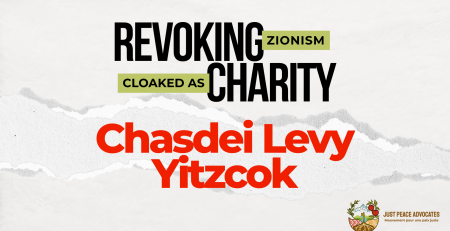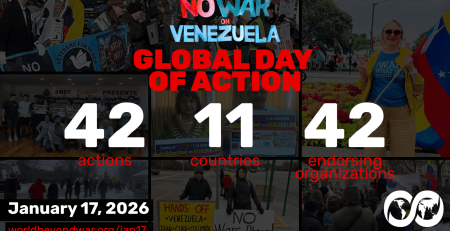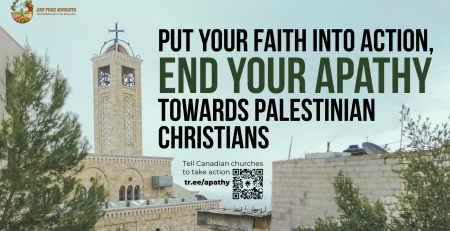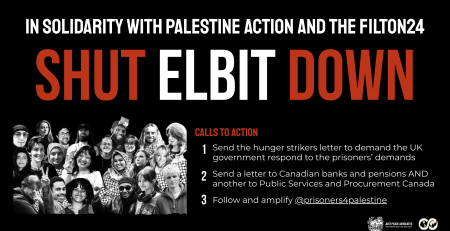In this new report, Just Peace Advocates, Al-Haq, and Kashmir Law & Justice Project further expose the role WSP Global, a Canadian multi-national company, plays in entrenching occupation and apartheid in Palestine and Kashmir. You can read the full report, download the PDF, or review a text-only version below.
Introduction
WSP Global is a major participant in Israel’s settler colonial apartheid regime and unlawful occupation in Palestine. It is the project manager for the Jerusalem Light Rail (JLR) and supported the Tel-Aviv Jerusalem Fast Train (A1) project located in unlawfully annexed and occupied Jerusalem. They are also significantly involved in the ongoing occupation of Kashmir, through their construction of the Chenab railway bridge. Just Peace Advocates and Al-Haq have made two submissions to the UN, requesting they be added to the UN Database of businesses operating in illegal Israeli settlements. Unfortunately, to date, WSP has evaded this, and all other consequences. Despite having an office in most major Canadian cities, WSP has not gotten the attention it deserves—for aiding Israel’s discriminatory apartheid practices, unlawful occupation and furthering illegal annexation.
While an engineering and consulting company is not the ‘flashiest’ divestment target, it is a critical one. Through railway infrastructure, WSP is re-entrenching occupation and annexation, attempts by the Occupying Powers to increase their control over stolen land.
What is WSP Global?
WSP is a Canadian, Quebec-based, company that provides technical expertise and strategic advice regarding construction and infrastructure. WSP has offices in over 51 countries globally, with 111 locations and 12,600 employees in Canada alone. WSP also has 8 major subsidiaries, of which it holds 100% interest. In 2024, WSP had 72,800 employees and CAD $16.17 billion in gross revenues. Notably, both the Canada Pension Plan Investment Board (CPPIB)—Canada’s national pension plan—and la Caisse de dépôt et placement du Québec (CDPQ)—which manages Quebec’s pension plan—are the largest WSP shareholders, with 8.9% and 13.89% respectively. This means all individuals contributing to the Canada Pension Plan (CPP) or the Quebec Pension Plan (QPP) are actively contributing to WSP’s violations of international law.
Activities in the Occupied Palestinian Territory
Tel-Aviv Jerusalem Fast Train (A1 Train)
Plans for the A1 train were proposed in the late 1990s and early 2000s, as a new and efficient transportation option between Tel-Aviv and Jerusalem. Despite various options, the Israeli government chose a route that crosses the Green Line twice. The Green Line is the official 1949 armistice line drawn between Israel and the West Bank (agreed at the time by Israel, Jordan, Syria and Lebanon). The project began in 2001 and the A1 train eventually opened in 2019. It illegally crosses into the West Bank at the Latrun Enclave and near the Palestinian villages of Beit Surik and Beit Iksa.
The Laturn Enclave has been declared a “closed military zone” since the Palestinian villages of Imwas, Yalu, and Beit Nuba, were destroyed and residents were evicted in 1967: “When the Israeli military planning committee discussed objections filed by the Palestinian land owners in July of 2005, alternative routes to the A1 train route included one option further south, through the Ayalon Valley, within the borders of the State of Israel. The committee decided to dismiss this option because of possible environmental harm to the Ayalon Valley.” The incursion into the West Bank near Beit Surik and Beit Iksa were not in the original plan for the A1 train. Rather, it occurred because the illegally transferred in Israeli settlers of Mevaseret objected to the original plan because of potential noise pollution and a decrease in property values due to ‘worse views’.
WSP was first involved with the A1 train in 2014, when it finalized the acquisition of Parsons Brinckerhoff who provided technical advisory services for the A1. Then, in 2016, the WSP-Parson Brinkerhoff team was contracted to complete the electrification of the A1, a NIS 12 billion project that included 420km of track, 13 passenger lines, and the construction of 14 railway stations. In 2018, WSP not only performed measurements and participated in a test drive of the measurements wagon, they also agreed to provide contractor coordination and project management services for 10 years.
Jerusalem Light Rail (JLR)
The JLR is a massive Israeli railway project that connects various illegal settlement blocks in occupied East Jerusalem to other areas of the city to “creat[e] territorial continuity and eas[e] settler movement.” It consists of three main lines, as well as various expansion projects.
Red Line
The Red Line connects the Pisgat Ze’ev settlement in occupied East Jerusalem with Mount Herzel. It also provides service to the Neve Ya’akov settlement and passes through French Hill, Givat HaMivtar, Ramat Eshkol, and Ma’alot approximately Dafna. This resulted in “significant expropriation of Palestinian property.” Since 2001, 81,600 m2 of Palestinian land was zoned for the light rail. The first land to be confiscated was in the East Jerusalem neighbourhood of Shu’fat by the Jerusalem Municipality. “Cutting across East Jerusalem to create territorial continuity between settlements, the JLR project is exacerbating the Israeli policy of suffocating Palestinian neighbourhoods, while simultaneously promoting Israeli construction and the expansion of settlement infrastructure in occupied East Jerusalem.” A planned extension of the Red Line (part of the “J-Net” project) will connect the Hebrew University on Mount Scopus in East Jerusalem to the Gilo settlement in the South.
Green Line
The Green Line is scheduled to open in March 2026. It will connect the Gilo settlement neighbourhood to Mount Scopus, and pass through the Ramat Eshkol, Ma’alot Dafna, and French Hill settlements in occupied East Jerusalem. In October 2023, there was a public tender procedure for the construction of 1,324 housing units on about 80 dunams of land next to the Green Line in the Gilo Settlement.
Blue Line
The Blue Line is the newest part of the JLR and is intended to be its longest axis. The Blue Line will connect the Ramot and Ramat Eshkol settlements with the Gilo settlement. It will also include infrastructure for two additional lines, the Azure and Purple Lines, to connect all three of the major lines.
When finally complete, the JLR will transport approximately 600,000 passengers a day. The expansion of the JLR not only includes additional railways, but massive parking lot projects adjacent to each line. As of April 2024, nine “park and ride” lots with 7,500 spaces were at different stages of construction. There is also a plan for 10,000 new housing units in the Gilo settlement and 7,000 m2 of open space for connecting pedestrians with the rail stations. WSP is deeply embedded in the JLR.
As project manager, WSP is responsible for monitoring the progress and quality of construction of the J-Net project—the expansion of the Red Line and Green Line development. Datumate, a construction technology company whose software WSP is using for the JLR, describes WSP as “an integral part of the operation, with a wide role that includes reviewing the designs, monitoring quality and progress on behalf of the State, and ensuring the project is completed to specification.” According to WSP Global Control Manager, Asaf Yaffe: “In many ways, the Light Rail project was unchartered territory…It’s a long-term project over a wide area, and there are multiple stakeholders to consider and include. We have the project company, which is responsible for the build, project managers on the state side, the municipality, the Bursar’s offices of the State, many designers from every side. I could go on.”
“WSP facilitates the practice of forcible transfer of settlers into the occupied Palestinian territory (OPT), through its construction and servicing of the JLR, while deepening the physical, social and economic integration of the settlements. Through its active maintenance of Israel’s illegal settlement enterprise[ in occupied Eastern Jerusalem, WSP is involved in gross and systematic violations of fundamental human rights against the protected Palestinian population.”
The UN Human Rights Committee has been clear that Israel must cease all construction and expansion of settlement in the occupied Palestinian territory (oPt), including East Jerusalem, and the occupied Syrian Golan.
Activities in Occupied Kashmir and Jammu
Chenab Railway Bridge
The Chenab bridge was conceived in the 1970s/1980s as part of 326km railway system planned to connect Jammu and Kashmir with India. While it was formally organized in the late 20th century, it had first been considered in 1898, but put on hold because of the complex nature of the terrain. In 2003, the Ministry of Indian Railways launched the Jammu–Udhampur-Srinagar-Baramulla Rail Line (JUSBRL) project. The Chenab bridge is part of the JUSBRL and connects Udhampur with the Kashmir Valley.
In June 2025, Prime Minister Modi inaugurated the Chenab railway bridge – the “highest and longest steel arch bridge for railway traffic” in the world, as WSP explains. The goal: “regional integration and economic development.” In other words, annexation, dispossession, and continued occupation.
“Designed to endure for 120 years and enable train speeds up to 100 km/h, the Chenab Rail Bridge is not just an engineering feat—it is an assertion of India’s capability to conquer both nature and time.”
“The rail bridge will permit the transport of military personnel and equipment around the year to the border areas,” said Giridhar Rajagopalan, deputy managing director of Afcons Infrastructure.
While “uncomfortable for many, the reality that [Kashmir and Jammu] is occupied is (or was) widely recognized, including by the United Nations (the UN Security Council’s resolutions regarding Jammu and Kashmir presuppose that neither India nor Pakistan has sovereign title over the territory).” India not only illegally occupies Kashmir but also has annexed and colonized the territory. The processes of occupation, annexation, and colonization are ongoing. India subjects Kashmiri people to land grabs, evictions, incarceration, harassment, criminal intimidation, crackdowns on religious freedom, and physical violence by the Indian-occupation. Middle East Eye stated that the Chenab bridge “serves Indian interests: transporting Hindu pilgrims, flooding the region with [I]ndian tourists, and crucially, creating a direct line for the transfer of troops and resources for the Indian military.”
As Stand With Kashmir articulated: “The [I]ndian government has estimated the total cost of the project at $5 billion. The railway line travels through 36 tunnels and over 943 bridges and is projected to facilitate the movement of people, goods, and military personnel…The timing behind the bridge’s inauguration, right after Operation Sindoor, is not merely coincidental. After [I]ndia’s recent conflict with Pakistan and crackdown in Kashmir, [I]ndia has been aiming to further militarize the Kashmir Valley.”
WSP boasts that it “designed the world’s highest and longest steel arch bridge for railway traffic in India.” They clearly recognize the bridge is located in Kashmir on their website, and flaunt their work saying, “[t]he end result is a convincing demonstration of WSP’s world-class steel bridge design expertise.”
India – like Israel – entrenches its occupation through construction and infrastructure projects, in denial of the right to self-determination.
Legal Context
WSP is complicit in systematic violations of Palestinians’ and Kashmiri’s rights and is in violation of gross breaches of international law. Through its foundational involvement in the JLR and it’s pivotal role in the Chenab bridge. International humanitarian law is binding on all actors whose activities are closely related to armed conflict, including businesses enterprises, whether or not they participate during active hostilities. Canada is responsible to take action to ensure Israel and India do not violate the Fourth Geneva Convention (Article 1).
Moreover, the International Court of Justice (ICJ) confirmed, in its July 2024 Palestine Advisory Opinion, that Israel’s presence in the Occupied Palestinian Territory is not only patently illegal and in breach of peremptory norms of international law, but also that UN Member States are responsible for extricating themselves from complicity in the occupation, racial segregation and apartheid. In response to this ruling, the United Nations Independent International Commission of Inquiry on the Occupied Palestinian Territory, including East Jerusalem, and Israel, released a Position Paper detailing States’ obligations in implementing the Advisory Opinion. They clearly state that:
“States must ensure that their business enterprises are not engaging in activities in occupied territory and are not benefiting from the unlawful occupation.”
And:
“The Commission is of the view that State responsibility entails due diligence on the part of the State to examine private enterprises incorporated in the State and nonprofit or non- governmental organizations registered in the State and their dealings with the State of Israel and the Occupied Palestinian Territory. These entities include trading firms, manufacturing enterprises, investment funds and banks facilitating money transfers. States must require a thorough due diligence review of these entities and ensure that they are not engaging in any business, activity or financial support that maintains the unlawful occupation or contributes to maintaining it. If a State finds that such entities are engaging in activities that maintain the unlawful occupation, the State must take all reasonable measures to prevent the activities, such as revoking a corporation’s articles of incorporation or revoking a non-profit organization’s registration in that State.”
WSP is arguably liable under international and domestic law as a corporation. In addition, their senior leadership, board members, and any agents of WSP can and should be held criminally liable for their involvement in war crimes and crimes against humanity.
Business corporations do not have legal immunity, whether in civil or criminal court. In the Bil’in case, the Superior Court of Quebec ruled that a legal person engaged in a war crime may be found at fault under Canadian civil law. Later, in Nevsun, the Supreme Court of Canada confirmed that private corporations may be liable under Canadian domestic law for breaches of customary international law committed outside of Canada and are not immune from civil suits brought against them by international plaintiffs. Further, corporations and individuals can be held criminally accountable under domestic law, particularly the Crimes Against Humanity and War Crimes Act and Geneva Conventions Act. Specifically, section 3(c) and (d) of Rome Statute Article 25 states that a person is responsible and liable if they:
c. “For the purpose of facilitating the commission of such a crime, aid, abet or otherwise assist in its commission or its attempted commission, including providing the means for its commission;
d. In any other way contribute to the commission or attempted commission of such a crime by a group of persons acting with a common purpose. Such contribution shall be intentional and shall either:
i. Be made with the aim of furthering the criminal activity or criminal purpose of the group, where such activity or purpose involves the commission of a crime within the jurisdiction of the Court; or
ii. Be made in the knowledge of the intention of the group to commit the crime”
Therefore, WSP can and should be held accountable for aiding and abetting in war crimes and crimes against humanity. This was further confirmed in UN Special Rapporteur Francesca Albanese’s recent report “From economy of occupation to economy of genocide.“
Beyond strict legal liability, WSP has obligations under various other human rights mechanisms. The UN Guiding Principles (UNGPs) recognize that businesses operating in conflict-affected areas – which include areas under occupation – face heightened risks of involvement in human rights abuses, including gross human rights abuses committed by other actors (Principle 7). In such situations, the Working Group clarified in the above-mentioned statement that where businesses have an increased risk, “enhanced” due diligence (namely, the “heightened care” with which due diligence processes should be executed) is required. Companies are also required to pay particular attention to human rights impacts on individuals from groups or populations that may be at heightened risk of vulnerability and marginalisation.
WSP’s own Code of Ethics declares their commitment to respect, support and safeguard human rights by “enhancing [their] processes to uphold international human rights standards established within the Universal Declaration of Human Rights [. . .] and the UN Guiding Principles on Business and Human Rights.” WSP has made a commitment not to be complicit in human rights abuses, which its involvement in the construction of the JLR and Chenab bridge clearly violates. It also violates UNGP 13 which requires business enterprises to “avoid causing or contributing to adverse human rights impacts through their own activities, and address such impacts when they occur”, and “seek to prevent or mitigate human rights impacts that are directly linked to their operations, products or services by their business relationships, even if they have not contributed to those impacts.”
Even further, WSP is accountable under the OECD Guidelines, which provide recommendations for multinational enterprises, with the goal of encouraging responsible trade and investment. While the Guidelines are voluntary and not legally enforceable, they can be regulated by national law or international commitments. Countries that adhere to the Guidelines are required to implement them, encourage their use, and set up National Contact Points “that promote the Guidelines and act as a forum for discussion of all matters relating to the Guidelines.” The OECD human rights responsibilities include a requirement to “[address] actual and potential adverse human rights impacts consists of taking adequate measures for their identification, prevention, where possible, and mitigation of potential human rights impacts, remediation of actual impacts, and accounting for how the adverse human rights impacts are addressed. The term ‘infringing’ refers to adverse impacts that an enterprise may have on the human rights of individuals.” As an adherent to the OECD Guidelines, Canada has a National Contact Point which ” contributes to the resolution of disputes concerning alleged non-observance of the OECD Guidelines by multinational enterprises, namely by implementing the specific instance process described in the Implementation Procedures of the OECD Guidelines.” Anyone who is a stakeholder with an interest and believes a multinational company has breached the Guidelines can make a complaint.
Investors
In addition to the CPPIB and CDPQ, many other Canadian and global institutions are invested in WSP including, but not limited to:
| Investor | # Shares | Value (Million) | % of WSP Holdings |
| RBC Global Asset Management | 2,659,297 | $538.8 | 2.04% |
| 1832 Asset Management | 2,437,181 | $493.8 | 1.79% |
| BMO Asset Management | 2,328,280 | $471.8 | 1.78% |
| TD Asset Management | 2,099,418 | $425.4 | 1.61% |
| CIBC Asset Management | 1,192,091 | $241.5 | 0.91% |
| Manulife Investment Management | 792,408 | $160.6 | 0.61% |
| Jarislowsky Fraser Ltd (Scotiabank) | 635,848 | $128.8 | 0.49% |
| Desjardins Global Asset Management | 348,972 | $70.7 | 0.27% |
| Sun Life Global Investments | 95,923 | $19.4 | 0.07% |
| National Bank Trust | 10,585 | $2.1 | 0.01% |
*This represents investments as of June 6, 2025 as listed on TIKR Terminal.
Additionally, the Quebec pension Fonds de solidarité FTQ—the largest development capital investment network in Quebec—held $4,354 million in WSP as of May 31, 2025. Further, multiple Canadian universities also held investments in WSP, including Vancouver Island University, Mount Allison University, Dalhousie University, Acadia University, and Memorial University, as of 2024. Note that, unlike CDPQ and CPPIB, most other entities are not legislatively required to disclose their investments. Therefore, we rely on voluntary disclosure and/or United States Securities and Exchange Commission (SEC) filings. The SEC is an agency of the U.S. government that enforces U.S. federal securities law. It is important to know that SEC filings have their limitations. In particular, they do not include companies that are only listed on the Toronto Stock Exchange – which includes WSP. Therefore, WSP is not listed on SEC filings.
Conclusion
The situations in Kashmir and Palestine are both a result of the British colonial project and its systematic denial of the right of the Kashmiri and Palestinian people to self-determination. In 2025, we see that these colonial projects are continuing to expand, resulting in ever worsening crimes including apartheid, persecution and genocide.
Like the Zionist framing of an “Israel-Palestinian conflict” which obscures the 77-year Nakba and settler colonial erasure of the Palestinian people by falsely suggesting this is a symmetrical armed conflict between two parties, the Hindutva project “labels Kashmir as an “internal bilateral issue”, concealing the reality of decades long occupation and colonization. All of this rhetoric rejects the reality that Kashmir and Palestine are under military occupation by settler-colonial projects.
WSP is actively participating in both of the Israeli and Indian occupations. They are enthusiastically aiding and abetting the expansion of these settler-colonial projects through war crimes. While WSP has wiped its site of any references to the JLR, it openly brags about its work in occupied Kashmir. This suggests that perhaps WSP knows what it is doing in Palestine is wrong—and it must know that its actions in Kashmir are no different. As a Canadian, multinational company, WSP must be held accountable for their participation in settler colonial, occupation projects – from Palestine to Kashmir.

